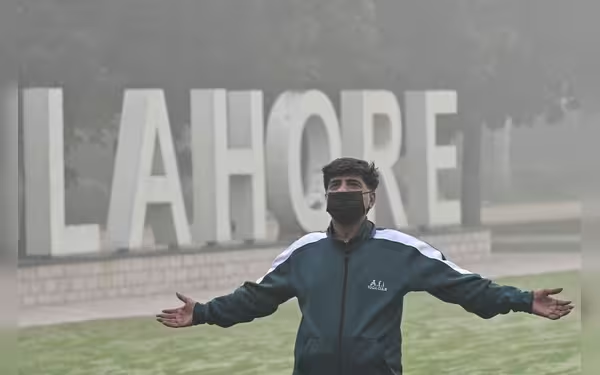Saturday, November 16, 2024 06:36 PM
Punjab Closes Public Spaces Amid Severe Smog Crisis
- Punjab shuts public spaces until November 17.
- Lahore's air quality exceeds 20 times WHO limits.
- Schools closed in major cities due to pollution.
 Image Credits: brecorder
Image Credits: brecorderPunjab closes public spaces as Lahore's air quality reaches alarming levels, posing serious health risks to residents.
In recent weeks, the province of Punjab, Pakistan, has been grappling with an alarming rise in air pollution, particularly in its major cities. The situation has escalated to the point where the local government has taken decisive action to protect public health. As a result, authorities have ordered the closure of public spaces, including parks, zoos, playgrounds, historic monuments, museums, and recreational areas, until November 17. This measure aims to mitigate the adverse effects of the thick smog that has enveloped the region.
The air quality in Lahore, the capital of Punjab, has reached staggering levels, with fine particulate matter (PM2.5) concentrations exceeding 20 times the acceptable limit set by the World Health Organization (WHO). The air quality index (AQI) in Lahore has soared above 1,000, a figure that is alarmingly higher than the 'dangerous' threshold of 300. For over a week, residents have been trapped in this hazardous environment, which poses serious health risks.
In response to the deteriorating air quality, schools in several major cities across Punjab were ordered to close on Tuesday, with the closure extended to additional cities on Wednesday. The smog is primarily caused by a combination of factors, including low-grade diesel emissions, smoke from seasonal agricultural burning, and the natural fog that settles in during the winter months. These pollutants create a toxic mix that significantly impacts the health of the population.
Last month, the government had already imposed restrictions on four 'hot spots' in Lahore, targeting tuk-tuks with polluting two-stroke engines and restaurants that operate barbecues without proper filters. These measures are part of a broader effort to combat the pollution crisis, which is exacerbated by seasonal crop burning on the outskirts of the city. The WHO has warned that prolonged exposure to such toxic air can lead to severe health issues, including strokes, heart disease, lung cancer, and respiratory diseases.
Moreover, the excessive pollution in Lahore has been shown to shorten the life expectancy of its residents by an average of 7.5 years, according to research from the University of Chicago’s Energy Policy Institute. The situation is dire, especially for children, as UNICEF reports that nearly 600 million children in South Asia are exposed to high levels of air pollution, which is linked to half of childhood pneumonia deaths.
As the government takes these necessary steps to protect public health, it is crucial for residents to remain informed and vigilant. While the closure of public spaces may be inconvenient, it is a necessary measure to ensure the safety of the community. Individuals are encouraged to stay indoors, use air purifiers if available, and limit outdoor activities during peak pollution hours. The fight against air pollution requires collective action, and every small step counts towards a healthier future for Punjab.













